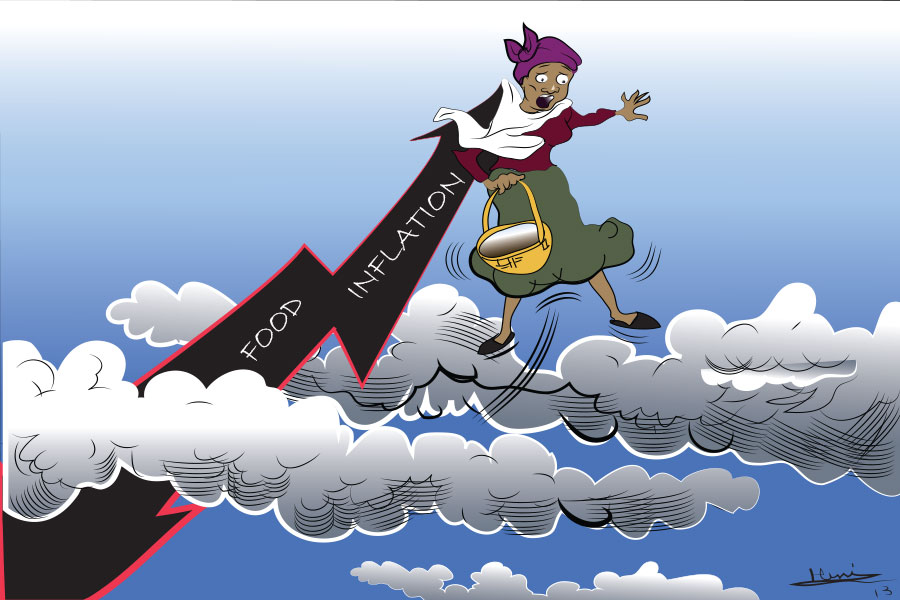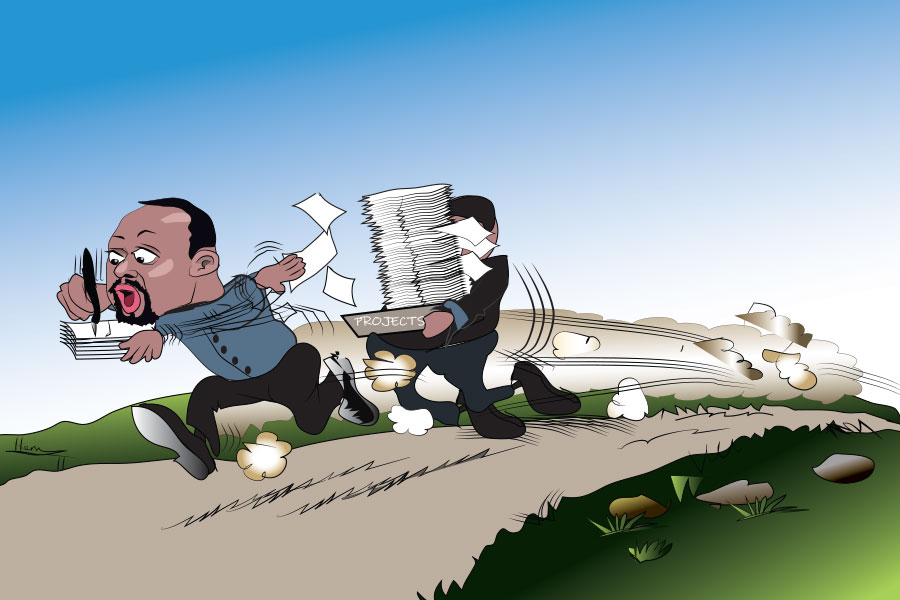
Radar | Jul 03,2021
Apr 22 , 2022
By Asseged G. Medhin
Inflation occurs in most cases when consumption ramps up without an accompanying increase in the production of goods and services. When this happens, prices rise and the currency within the economy is worth less than it was before. The currency essentially will not buy as much as it would before. When a currency is worth less, its exchange rate weakens against a basket of other major currencies. However, this depends on the inflation of other countries as well.
Headline inflation has been in the 30-40pc range in Ethiopia for a while. Everything is increasing in price. Even those goods and services produced locally increase beyond expectation compared to imported goods or domestic goods that require raw material sourced overseas. Combined with political shocks, it could exasperate the economic situation further.
The government needs to intervene, but why?
If it employs a contractionary monetary and fiscal policy by reducing the money supply and lessening deficit financing, the economy may be thrown into a recession because spending will crash. If reserve requirements, which is the amount of money banks are legally required to keep on hand to cover withdrawals, are raised further instead, it kills the dynamism of banks and sends the wrong signal at a time when it is trying to open up.
No less pertinent here is that inflation is also a psychological phenomenon, not just an economic one. There is little the government can do when people expect elevated inflation to occur. This expectation is hard to change unless a significant time passes where there is no above-average inflation.
In the most advanced economies, contradictory monetary policy is likely to be followed, reducing the supply of money by increasing interest rates. Our economy is an interesting one, where banks continue to make profit in an economy with negative loan and deposit interest rates. Additionally, both capital and stock exchange markets have not been established, which are effective tools for controlling inflation.
It is true that even in the United States, inflation is nearing double-digits. This global impact of the rise of inflation, driven by a faster than expected growth in demand and supply shocks induced by the Russia-Ukraine war, requires both policy and regulatory intervention.
As a means of measure, the central bank may increase savings interest rates. But in order to make money, they must lend it at a higher rate. They will have no choice but to increase their rates as well. As a result, fewer people want to borrow money because it costs more to do so while that money accrues at a higher interest rate. So spending drops, prices drop and inflation slows.
The government should also craft crises management economic program with detail priorities to reach some of its development objectives and normalise its spending until major macro variables are balanced. It should exert its effort in stimulating the economy through different incentives, and should revise its plans to lift fuel subsidies.
Another thing it can do is increase reserve requirements on the amount of money banks are legally required to keep on hand. The more money banks are required to hold back, the less they have to lend to consumers. If they have less to lend, consumers will borrow less, which will decrease spending. The reserve requirement has already been doubled last year. This should be extended even higher. The National Bank of Ethiopia (NBE) should also reconsider the continued depreciation of the Birr to increase export revenue. It has never been an effective policy, and it is not going to start now.
A deep economic crisis may be created unless the government intervenes wisely. The rise in the cost of living is unsustainable and is impoverishing the average consumer. Policymakers should rise to the challenge.
PUBLISHED ON
Apr 22,2022 [ VOL
23 , NO
1147]


Radar | Jul 03,2021

Commentaries | Jun 05,2021

Viewpoints | Apr 26,2025

Editorial | Jul 24,2021

Viewpoints | Jul 13,2024

Fortune News | Jul 18,2020

My Opinion | Feb 19,2022

Editorial | May 03,2025

My Opinion | Jul 24,2021

Editorial | Jun 01,2019

My Opinion | 131819 Views | Aug 14,2021

My Opinion | 128203 Views | Aug 21,2021

My Opinion | 126147 Views | Sep 10,2021

My Opinion | 123767 Views | Aug 07,2021

Dec 22 , 2024 . By TIZITA SHEWAFERAW
Charged with transforming colossal state-owned enterprises into modern and competitiv...

Aug 18 , 2024 . By AKSAH ITALO
Although predictable Yonas Zerihun's job in the ride-hailing service is not immune to...

Jul 28 , 2024 . By TIZITA SHEWAFERAW
Unhabitual, perhaps too many, Samuel Gebreyohannes, 38, used to occasionally enjoy a couple of beers at breakfast. However, he recently swit...

Jul 13 , 2024 . By AKSAH ITALO
Investors who rely on tractors, trucks, and field vehicles for commuting, transporting commodities, and f...

Jul 5 , 2025
Six years ago, Ethiopia was the darling of international liberal commentators. A year...

Jun 28 , 2025
Meseret Damtie, the assertive auditor general, has never been shy about naming names...

Jun 21 , 2025
A well-worn adage says, “Budget is not destiny, but it is direction.” Examining t...

Jun 14 , 2025
Yet again, the Horn of Africa is bracing for trouble. A region already frayed by wars...

Jul 6 , 2025 . By BEZAWIT HULUAGER
The federal legislature gave Prime Minister Abiy Ahmed (PhD) what he wanted: a 1.9 tr...

Jul 6 , 2025 . By YITBAREK GETACHEW
In a city rising skyward at breakneck speed, a reckoning has arrived. Authorities in...

Jul 6 , 2025 . By NAHOM AYELE
A landmark directive from the Ministry of Finance signals a paradigm shift in the cou...

Jul 6 , 2025 . By NAHOM AYELE
Awash Bank has announced plans to establish a dedicated investment banking subsidiary...